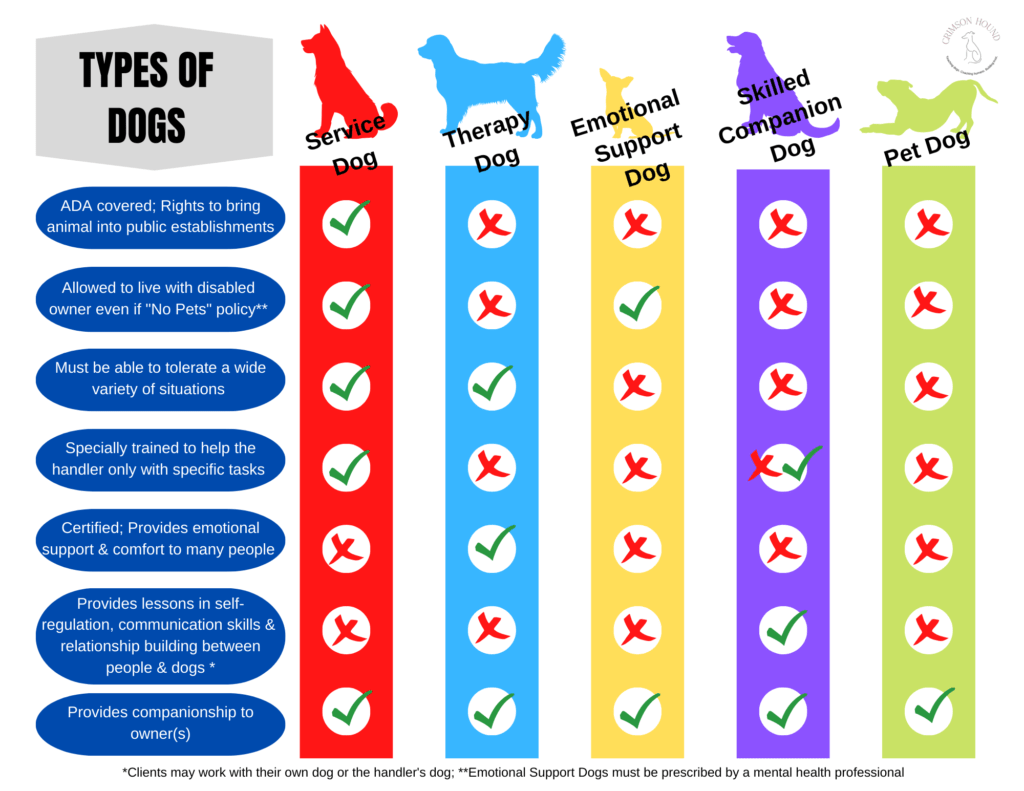Therapy Dog, Service Dog, Emotional Support Animals … SA, ESA, PSD … What does it all mean?!?
The rules, regulations and terminology surrounding support animals can be overwhelming. As a result, the confusion leads to misunderstandings, mislabeling and misuse.
The Americans with Disabilities Act (ADA) and the Fair Housing Act (FHA) govern and define support animals.
The Americans with Disabilities Act (ADA) prohibits discrimination against individuals with disabilities in public spaces. The ADA differentiaties between service animals and non-service animals and provides protections for service animals only.
The Fair Housing Act (FHA) states that individuals with disabilities can request reasonable accommodations for housing in the case of animals that assist them at home and in public. The FHA defines types of assistance animals and provides protections for certain types of assistance animals, including service and emotional support animals – ONLY with regards to housing.
Service Animal
The ADA defines a service animal as “any dog that is individually trained to do work or perform tasks for the benefit of an individual with a disability, including a physical, sensory, psychiatric, intellectual, or other mental disability. Other species of animals, whether wild or domestic, trained or untrained, are not considered service animals.”
This definition applies to both dogs and miniature horses. The ADA applies ONLY to service animals and covers both Title II (state and local government programs) and Title III (places of public accommodation, such as restaurants or retail merchants).
WHAT DO SERVICE ANIMALS DO? Service animals perform a task(s) for a specific person; such as, seizure response, mobility assistance, autism assistance, hearing/visual assistance, psychiatric assistance, diabetic or allergy alert, etc.
WHAT ARE THE TRAINING REQUIREMENTS? A service animal performs work or tasks for an individual with a disability. Generally, SAs are trained by a service dog organization or a private dog trainer, but they may be trained by the owner of the animal. Service animals undergo extensive training in both obedience and performing tasks in order to ensure that the animal is able to perform his task in any environment.
IS THERE A NATIONAL DATABASE FOR SAs? No. There are no license, permit or registration requirements for service animals. As a matter of fact, a vest, harness and/or leash is not required as it could interfere with the animal’s ability to perform tasks as long as the handler has the animal under voice or hand signal control.
WHERE IS ACCESS PERMITTED? Service animals go anywhere a human member of the public goes; although there are some exceptions in locations where the dog’s presence could pose legitimate public safety concerns.
CAN PUBLIC ACCESS CAN BE DENIED?
Under some circumstances, yes. The animal …
- is not housetrained (e.g., urinating/defecating in a restaurant, etc.)
- is posing a threat to the safety of others
- is not being controlled by the handler
- cannot be reasonably accommodated due to size or weight (usually applies to horses)
WHAT QUESTIONS CAN BE ASKED?
When the need for the SA is not obvious, two questions can be asked of the handler:
- Is the animal required because of a disability?
- What work or task has this animal been trained to perform?
WHAT CANNOT BE ASKED OR REQUIRED?
You may not:
- ask about the nature or extent of the disability
- request documentation
- require a vest on the animal
- require a harness and leash as it can interfere with the animal’s ability to perform the task
ARE THERE VACCINATION OR LICENSE REQUIREMENTS? You must comply with your state and municipality laws. In Wisconsin, all dogs must be up to date on rabies vaccinations and licensed in their home county. However, there are no such requirements for horses in the state of Wisconsin.

Unfortunately, the lack of strict regulations opens a loophole that has allowed a growing industry of online companies who provide SA and ESA certificates for support animals, harnesses, ID tags and even fake ESA letters.
Emotional Support Animal
The FHA states that “Assistance animals are not pets. They are animals that do work, perform tasks, assist, and/or provide therapeutic emotional support for individuals with disabilities. There are two types of assistance animals: (1) service animals, and (2) other animals that do work, perform tasks, provide assistance, and/or provide therapeutic emotional support for individuals with disabilities (referred to in this guidance as a “support animal”). “
WHAT DO EMOTIONAL SUPPORT ANIMALS DO? Emotional support animals provide therapeutic support and companionship to their person.
WHAT ARE THE TRAINING REQUIREMENTS? No additional training is required for ESAs beyond what is be expected for any pet.
IS THERE A NATIONAL DATABASE FOR ESAs? No. There are no license, permit or registration requirements for emotional support animals for the same individual privacy reasons that there is no database for service animals.
WHERE IS ACCESS IS PERMITTED? Support animals are covered by the FHA; therefore, have housing protections. However, it does not extend any farther. ESAs have access only to public spaces that already allow pets.
WHAT QUESTIONS CAN BE ASKED/REQUIRED BY HOUSING PROVIDERS? Housing providers have the right to ask for a letter from a health care professional that includes:
- the patient’s name
- the letter writer’s relationship to the patient
- the purpose for the ESA
- the type of animal for which accommodations are being asked
WHAT ARE THE OBLIGATIONS OF HOUSING PROVIDERS? Individuals with a disability can request reasonable accommodations and/or modifications in order to keep an emotional support animal regardless of pet restrictions.
The housing provider CANNOT
- refuse to rent or sell housing because of an ESA
- evict a tenant because of an ESA
- charge higher rent, a pet deposit or a pet fee to a person with an ESA
- refuse to provide reasonable accommodations or modifications
- refuse to provide housing on the basis of breed or weight restrictions
- contact the writer of the ESA letter or ask the individual for details of their disability
HOW MANY ESAs CAN AN INDIVIDUAL HAVE? Generally, individuals have one ESA; however, an individual can have more than one ESA if each animal serves a different, documented purpose. In reality, each person in a particular unit may have their own ESA.
CAN A TENANT BE DENIED HOUSING OR EVICTED?
Housing may be denied or a tenant may be evicted if:
- the individual does not provide an ESA letter or provides fake documentation
- the housing provider demonstrates that necessary accommodations/modifications would impose an undue financial and administrative burden
- the request would fundamentally alter the essential nature of the operations
- the ESA poses a direct threat to the health or safety of others despite any other reasonable accommodations that could eliminate or reduce the threat
- the ESA would or does cause significant damage to the property of others despite any other reasonable accommodations that could eliminate or reduce the threat
ARE THERE VACCINATION OR LICENSE REQUIREMENTS? You must comply with your state and municipality laws. In Wisconsin, all dogs and cats must be up to date on rabies vaccinations and licensed in their home county. However, there are no such requirements for other animals in the state of Wisconsin.
This is a list of short videos that help health care professionals walk through the process of writing ESA letters for clients.
Service Animals vs Emotional Support Animals
Emotional Support Animal Regulations & Guidelines
Discussing ESA Considerations with Your Client
3 Things Therapists Need to Provide Before Providing an ESA Letter
ESA Letter Templates for Housing & Travel

Skilled Companion Dog
According to the FHA, “an animal that does not qualify as a service animal or other type of assistance animal is a pet for purposes of the FHA and may be treated as a pet for purposes of the lease and the housing provider’s rules and policies. A housing provider may exclude or charge a fee or deposit for pets in its discretion and subject to local law but not for service animals or other assistance animals.”
WHAT DO SKILLED COMPANION DOGS DO? Skilled Companion Dogs are trained to assist with a variety of physical and/or psychological challenges within the home. They are NOT Service Dogs or Emotional Support Dogs. They are pet dogs who have been trained to support their owner with a variety of simple, directed tasks, as well as provide comfort and emotional support. Examples of what a SKD may be trained for are retrieving dropped items, opening drawers, turning lights on/off, deep pressure therapy or relaxation techniques. They can be trained to alert to nightmares or to retrieve medications; however, they are not specialized in a particular skill and do not have public access or special housing accommodations.
WHAT ARE THE TRAINING REQUIREMENTS? There are no specific training requirements. A skilled companion dog may have been hand-picked and undergone up to two years of professional training by a private organization or they can be a dog that is already in the home who is trained by the owner under the guidance of a professional dog trainer. These dogs have learned basic obedience cues and are generally friendly and well-socialized.
WHERE IS ACCESS IS PERMITTED? Skilled companion dog public access is dependent upon state, county and local ordinances. Whereas access on private property is up to the discretion of the property owner. Retail locations who allow pets will have signage posted and/or information on their website.
ARE THERE VACCINATION OR LICENSE REQUIREMENTS? You must comply with your state and municipality laws. In Wisconsin, all dogs and cats must be up to date on rabies vaccinations and licensed in their home county. There are no such requirements for other animals in the state of Wisconsin.

Therapy Animal
A therapy animal performs a different job than SAs and ESAs. These animals provide psychological or physiological therapy for individuals other than their handlers. Since TAs provide assistance to others, they are not covered by either the ADA or the FHA.
WHAT DO THERAPY ANIMALS DO? Therapy animals provide comfort and support to people other than their handler.
WHAT ARE THE TRAINING REQUIREMENTS? Therapy animals must have the appropriate personality for their work. Most important, they should enjoy meeting new people, actively seek out interaction and affection and be comfortable in new environments. They also need to be under control at all times. For dogs, this generally involves basic obedience training. Depending on the type of therapy the animal will be providing, additonal training may be necessary or required. Additionally, a temperament test is required by some therapy dog organizations. For example, the AKC Canine Good Citizenship test (CGC) or an examination by a TA evaluator. The dog must pass a certification test prior to working as a therapy animal. Cats and other animals are not required to undergo the same type of testing/certification.
IS THERE A NATIONAL DATABASE FOR TAs? Yes and No. Therapy dogs must be registered with one of several national pet therapy organizations. While these organizations have databases and provide insurance for TA teams, there is not all encompassing nationa database.
WHERE IS ACCESS IS PERMITTED? Therapy animals are allowed general public access to any places that allow other pets. In addition, they are permitted in public and private locations where they have pre-approved access permission for therapy purposes.
IS A CERTIFICATION OR ID REQUIRED?
Yes. Therapy animals are registered with a national TA organization and provided with an ID.
ARE THERE VACCINATION OR LICENSE REQUIREMENTS? Yes.
- You must comply with your state and municipality laws. In Wisconsin, all dogs and cats must be up to date on rabies vaccinations and licensed in their home county. However, there are no such requirements for other animals in the state of Wisconsin.
- Your national organization may have additional requirements such as additional vaccinations, annual fecal exams or annual veterinary wellness exams.

Pet or Companion Animal
According to the FHA, “an animal that does not qualify as a service animal or other type of assistance animal is a pet for purposes of the FHA and may be treated as a pet for purposes of the lease and the housing provider’s rules and policies. A housing provider may exclude or charge a fee or deposit for pets in its discretion and subject to local law but not for service animals or other assistance animals.”
WHAT DO COMPANION ANIMALS DO? Our pets are our companions, our partners, our teammates, our comfort, our home … They give us joy, join us in activities and give us comfort.
WHAT ARE THE TRAINING REQUIREMENTS? Companion animals do not have any requirements for training other than local ordinances regarding leash laws and animals being under control in public and not running at large.
WHERE IS ACCESS IS PERMITTED? Companion animal public access is dependent upon state, county and local ordinances. Whereas access on private property is up to the discretion of the property owner. Retail locations who allow pets will have signage posted and/or information on their website.
ARE THERE VACCINATION OR LICENSE REQUIREMENTS? You must comply with your state and municipality laws. In Wisconsin, all dogs and cats must be up to date on rabies vaccinations and licensed in their home county. There are no such requirements for other animals in the state of Wisconsin.



Kerrie Hoar, M.S., CDBC, CPDT-KA, ADT, FFCP
Kerrie Hoar has a master’s degree in Biology and is a certified dog behavior consultant, certified professional dog trainer and fear free professional. She owns Crimson Hound LLC dog training in La Crosse, Wisconsin.

